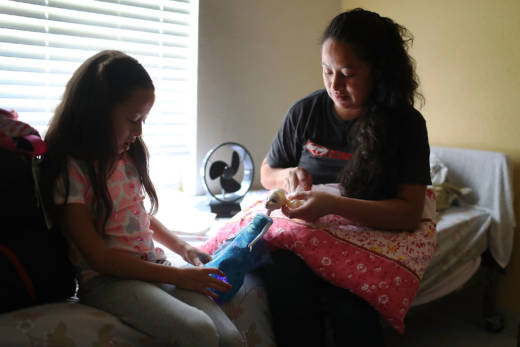Sabraw didn't say what he would do to ensure that reunifications of deported parents and their children who remain in the United States would happen. About 430 parents have been deported without their children.
Sepulvado spoke with attorney Lee Gelernt after the status conference. Gelernt is deputy director of the ACLU national Immigrants' Right's Project and lead counsel on the case against the government's practice of family separation, which Sabraw ended by court order a month ago.
In addition to concerns of deportations, some parents have been excluded from the class of people eligible to be reunified with their children -- based on unspecified individual crimes. Here is a transcript of part of a conversation between Sepulvado and Gelernt outside the courthouse Friday:
Sepulvado: Do you have any sense of how widespread that is (excluding parents on the basis of criminal history), or if this is a common reason for parents not to be reunified with their children?
Gelernt: We do not know how the government has divided between serious and non-serious. That's why we are asking for specific information about each individual. We suspect that we're going to find that a lot of parents entitled to reunification do not have crimes that bear on their fitness to be a parent. But until we get a list and that specific information, we are at a loss. The government asked us at court to trust us, essentially, to trust them at their word, that they're only excluding very serious criminals that shouldn't be parents. We're not going to trust them. We need to independently verify.
Sepulvado: One of the things the government said in court was that providing different types of lists, either if it's information about people who've already been deported, or even in the case of this, lists that give accurate reasons for why reunification didn't take place, that it's too burdensome and that essentially, they won't be able to work on the issue of reunifying because they'll be too busy filling your data requests.
Gelernt: I think that what litigation has shown is that when government is left to their own devices and doesn't have to provide the plaintiffs and court with lists, things drag on. And so that's why we are extremely pleased that the court has gotten involved and forced them to give them lists. I would also just add that the United States government is not some small law firm that has a finite number of people to work on it. They've separated these children; they had more than enough people to separate these children and traumatize these children. If they need to put additional people on this case, then they should do it. But they shouldn't say that these little children have to be damaged one day more, because they are unwilling to put addition staff on.
The California Report is at the border and will continue to bring you immigration coverage — stories of reunification, deportation, asylum and more.
